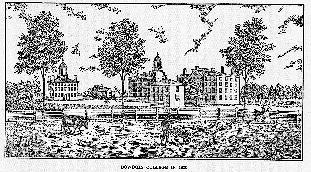Chapter 5
THE NEW ENGLAND POETS
I. HENRY WADSWORTH LONGFELLOW: 1807-1882.
Parentage.
HENRY WADSWORTH LONGFELLOW, the most widely read of all the American poets and the one that has the closest hold upon the hearts of the American people, was born in Portland, Maine, February 27, 1807. His father, a graduate of Harvard College, was a leading lawyer in the city. Both parents were of the best English stock and descendants of the early settlers in New England. On his mother's side, the poet traced his ancestry to John Alden, whose peculiar courtship of the Plymouth maid, Priscilla, he was to celebrate in one of his happiest poems. It was from his mother, a lover of nature and of poetry, that Longfellow inherited his romantic taste and his literary ambition.
Youth.
School life commenced early for this boy. He began to study at three, and was placed in an academy at six; at seven he was well on his way through the Latin grammar; and was reported by his master "one of the best boys we have in school. . . . His conduct last quarter was very correct and amiable." There were eight children in the home, four brothers and four sisters; Henry was the second child. Books were at hand; and out of doors there was not a little to stir the imagination of a boy in the brisk seaport town which has always been noted for both enterprise and beauty. Its picturesque features were never forgotten. In the descriptive poem, My Lost Youth, written in 1855, they are vividly recalled, -- the pleasant streets of the sea-side town, the gleam of the sunlight on the bay, the harbor islands, the garrison in the little fort, the sea-fight between the Enterprise and the Boxer, which was watched by the citizens, from the shore. Like Irving, Longfellow was fascinated by the sight of the wharves and the shipping; and thus he writes:--
"I remember the black wharves and the slips,
And the sea-tides tossing free;
And Spanish sailors with bearded lips,
And the beauty and mystery of the ships,
And the magic of the sea.
. . . . .
"I remember the gleams and glooms that dart
Across the school-boy's brain;
The song and the silence in the heart,
That in part are prophecies, and in part
Are longings wild and vain.
And the voice of that fitful song
Sings on, and is never still:
`A boy's will is the wind's will,
And the thoughts of youth are long, long thoughts.'"1
Longfellow was twelve years old when Irving's Sketch-Book appeared; the young reader was immediately captivated by its charm. At thirteen, he began to write verse, some of which was printed in the newspapers. He was fourteen when he passed his entrance examinations for college.
Bowdoin.
Literary Ambitions.
In 1822, Longfellow became a student at Bowdoin College, and was admitted to the Sophomore Class.
In college, he was a general favorite, social in disposition, but above everything else, the industrious
student and voluminous reader. We have already seen that his acquaintance with Hawthorne, his classmate,
was comparatively slight.1 Although Long-fellow wrote considerable prose and verse, some of which was
published in the United States Literary Gazette, of Boston, there is little in the work of this period which
calls for comment. We note the recurrence of nature themes, and the influence of Bryant's poems -- an
influence so strong that these early compositions appear hardly more than imitations. Before the end
of his college course, Longfellow had recognized his true vocation, and had formulated his desires in a
letter to his father, written in his senior year. 
| Previous chapter | Back | Home | Email this | Search | Discuss | Bookmark | Next chapter/page |
See our FAQ for more details.